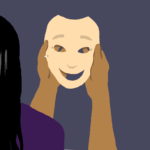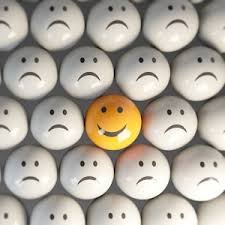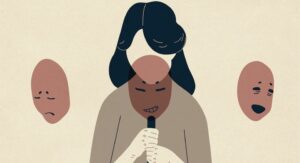Depression is a major mental health issue that can take many shapes and forms. The type of depression that we are talking about in this article, however, is usually characterized by “smiling depression.”
Smiling Depression is very common among people who suffer from it, yet its symptoms are often overlooked. We will now go over the different types of smiling depression as well as their effects on an individual’s life. We will also list down the symptoms and coping strategies to help you win over it. Now Smile!
Contents
- 1 What Is a Smiling Depression?
- 2 What Are The Types Of Smiling Depression?
- 3 How Does Smiling Depression Feel Like?
- 4 What Are the Common Symptoms Of Smiling Depression?
- 5 How Common Is The Prevalence Of Smiling Depression?
- 6 How To Diagnose Smiling Depression?
- 7 What Are The Possible Ill Effects Of Smiling Depression?
- 8 What is the Treatment for Smiling Depression?
- 9 How To Cope With Smiling Depression?
- 10 Psychologists On Smiling Depression
- 11 Conclusion
What Is a Smiling Depression?

Smiling depression is a term used to describe a type of depression that is often masked by the individual’s appearance. This can be due to the person appearing happy and put together on the outside, while they are struggling with dark thoughts and feelings on the inside. It is a type of depression that is often hard to diagnose.
People with smiling depression often experience the same symptoms as other types of depression, such as fatigue, loss of interest in activities, feelings of worthlessness or guilt, and suicidal thoughts. However, someone with smiling depression may not always show these symptoms.
People with smiling depression are more likely to be diagnosed with other mental health conditions, such as anxiety disorders and personality disorders. Again, they are also more likely to use drugs and alcohol as a way of coping with their depression.
Brief Background Of The Term
The term “smiling depression” was first coined by psychoanalyst Frieda Fromm-Reichmann in her 1959 dissertation. She noticed that some of her depressed patients would smile, even though their feelings were anything but happy. The phrase stuck and has come to be used more commonly in recent years.
NOTE: Smiling depression is more common than you may think. It is estimated that about two percent of the population suffers from this type of depression.
What Are The Types Of Smiling Depression?
There are different types of smiling depression, but all of them have one common thing: They make you feel like you’re living a double life. You may be happy and smiling on the outside, but on the inside, you’re feeling down and hopeless.
There are two main types of smiling depression:
- Masked Depression
- Cheerful Depression
Masked Depression

Masked Depression is when you don’t show your true feelings of sadness. But people can sense that something is wrong. They may think you’re just fine. You may not tell them that you’re feeling down. You keep your feelings to yourself, but people can sense it anyway.
Cheerful Depression

This type of depression makes it difficult for other people to notice the symptoms on your face. You are always happy, even when you’re feeling sad. People may think that you don’t have any problems at all.
It’s because your face is constantly in a smile or laugh, but inside of you, there is an emptiness and pain. A sense of loneliness and despair overwhelms your heart while wearing this mask on the outside to keep everyone out.
How Does Smiling Depression Feel Like?
Those who suffer from smiling depression may describe their symptoms as feeling numb. They might not feel emotions in a traditional sense, or they may feel like they are wearing a mask and are not able to be their true selves around others. They often feel like they are stuck in a cycle of negative thoughts and emotions that are difficult to break free from.
What Are the Common Symptoms Of Smiling Depression?

People who have this kind of depression may not show any signs and symptoms on their faces or in their behaviors. They look like they’re doing okay. But deep inside them is a sadness that never seems to go away. No matter how hard they try to fight it, they can’t help but feel down most of the time.
While someone with smiling depression might not appear like they have any outward symptoms, there may be tell-tale signs that all is not well. These could include:
- Overly positive demeanor, even when things are going wrong
- Constantly smiling or laughing, even when nothing is funny
- Being very controlling and perfectionistic
- Feeling tired all the time but never sleeping well at night
Additionally, other symptoms often can be shown or felt as:
- Feelings of worthlessness or guilt
- Inability to concentrate or make decisions
- Insomnia or oversleeping
- Loss of appetite or overeating
- Fatigue or loss of energy
- Persistent thoughts of death or suicide
If you have some or all of these symptoms, it doesn’t mean that you have smiling depression. But if they’ve been going on for a while and are causing problems in your life, it’s a good idea to see a mental health professional. They can help you figure out what’s going on and how to get better.
NOTE: It is important to note that smiling depression is not a formal diagnosis, but rather a label that is used to describe the mental state of an individual who shows little emotion on their face, even when they are feeling sad.
How Common Is The Prevalence Of Smiling Depression?

Smiling depression can be hard for others to see because many people with this type of depression smile and laugh even though they don’t feel happy. If you think you might have smiling depression, talk to your doctor or a mental health professional as soon as possible. They will listen to your symptoms and help you get the care that you need.
Further, smiling depression is more common than people might think. It’s been estimated that around two to four percent of people experience it at some point in their lives. So, if you’re feeling down and like everyone else around you seems happy, you may be experiencing smiling depression.
NOTE: Smiling Depression can be especially harmful. Because people with smiling depression may not realize they are depressed. Or they may feel guilty or ashamed about their condition and try to hide it.
How To Diagnose Smiling Depression?

Smiling Depressive Disorder is not as easy to diagnose as actual depression. It will be hard, especially since people who suffer from Smiling Depressive Disorder aka Smiling Depression might not even recognize that there’s a problem.
Some even feel like “it’s better than feeling nothing”. However, this is usually the most dangerous phase of Smiling Depression because this is when it’s harder to recognize what they are feeling. The best way to do it is by checking the following symptoms:
- You laugh and smile when you’re feeling down
- You feel like a burden to others
- Your mood changes depending on how people treat you
- You isolate yourself from friends and family
- You have negative thoughts about yourself and the world around you
- You feel like life isn’t worth living anymore
If most of these symptoms look familiar, you may be suffering from Smiling Depressive Disorder. Please seek help if you can, there are a lot of people who want to help you feel better.
What Are The Possible Ill Effects Of Smiling Depression?

Smiling depression can have some serious ill effects on people’s lives. Some of the most common are:
- Feeling isolated and alone, even when surrounded by others
- Having low self-esteem and feeling like you’re not good enough
- Experiencing difficulty in relationships due to feeling unworthy of love
- Having difficulty concentrating or completing tasks
- Feeling like you’re constantly walking on eggshells, never knowing when you might “snap”
- Suicidal thoughts or behaviors
All of these effects can lead to a decreased quality of life and even suicidal thoughts. If you are experiencing any of these symptoms, it is important to seek help from a mental health professional. A therapist can help you understand and cope with your smiling depression. There is no shame in admitting that you need help and getting the support you need to live a full, happy life.
NOTE: You don’t have to suffer in silence – there is help available.
What is the Treatment for Smiling Depression?
The treatment will depend on how severe your case of smiling depression is and what other factors might be playing into it. The best way to treat this disorder is by talking with therapists or counselors about your thoughts and feelings. Some medications can help regulate your mood, but it’s best to consult with a professional before taking any kind of medication.
Talk It Out
Some people might find it hard to go outside and talk to somebody about their problems. In this case, there are other ways to seek treatment for smiling depression. You can find online counseling and help your friends and family know what you’re going through. You can also write about your negative thoughts and feelings in a journal, this might make it easier to cope with the sadness that comes with smiling depression.
Self Help Strategies
Another thing you could do is to try self-help strategies such as: exercising regularly (even if it’s just walking), eating a healthy diet, sticking to a sleep schedule, and avoiding caffeine. These self-help strategies might not cure Smiling Depressive Disorder aka Smiling Depression but they can help you feel better over time.
How To Cope With Smiling Depression?
If you’re dealing with smiling depression, it’s important to seek help. But that doesn’t mean you have to do it alone. There are plenty of people who can support you, including friends, family members, and mental health professionals.
Here are some ways to cope with the disorder:
Talk to someone
Talking openly and honestly about your feelings can be helpful, especially if you don’t feel like talking to people in your everyday life. Find a friend, family member, therapist, or any other support system who will listen without judgment and help you work through your feelings.
Seek professional help
If your symptoms are severe or you feel like they’re impacting your quality of life, it might be a good idea to seek professional help. A therapist can provide you with the tools and support you need to manage your depression.
Keep your routine
It’s important not to skip activities that help keep you healthy and happy, like eating right, exercising regularly, getting enough sleep, drinking plenty of water, and taking time for yourself each day.
Be gentle with yourself
Accept that you’re going through a tough time and permit yourself to do things differently than you usually would. Give yourself time to heal and don’t expect to suddenly be “cured.”
Get creative
Channeling your creativity can be helpful when coping with any type of depression. Whether it’s writing, painting, dancing, or cooking, find an activity that brings you joy and do it regularly.
It can be difficult at times but it is important to connect with family and friends. They can help you stay positive through difficult times.
Stay hopeful
Despite feeling down at times, it’s important to remember that things can and will get better. cultivate hope by focusing on the good in your life and remembering that depression is treatable.
NOTE: Smiling depression is a serious condition that can lead to suicidal thoughts or actions if not treated in time. If you are experiencing any of these symptoms, it’s important to seek help immediately from a professional who specializes in the treatment of smiling depression.
Psychologists On Smiling Depression
Smiling depression is a relatively new term that has been coined in the last few years. It describes a type of depression that is often characterized by a person’s ability to put on a happy face. Even though they are feeling down and sad on the inside. It can be difficult to diagnose because it does not fit into the traditional model of depression.
Conclusion
Smiling Depression is quite an uncommon disorder that affects people from all walks of life regardless of their age or gender. It will be hard to diagnose yourself with smiling depression. But once you do it’s important to seek help. There are a lot of people who want to support and motivate you. So please talk about your problems instead of keeping them inside.
For more information, please contact MantraCare. Depression is a mental illness characterized by persistent feelings of sadness, hopelessness, and loss of interest in daily activities. If you have any queries regarding Online Depression Counseling experienced therapists at MantraCare can help: Book a trial Depression Therapy session


